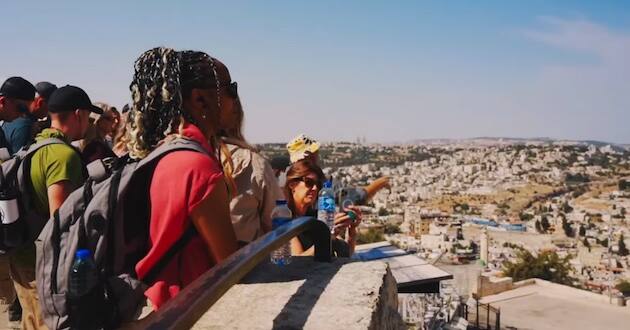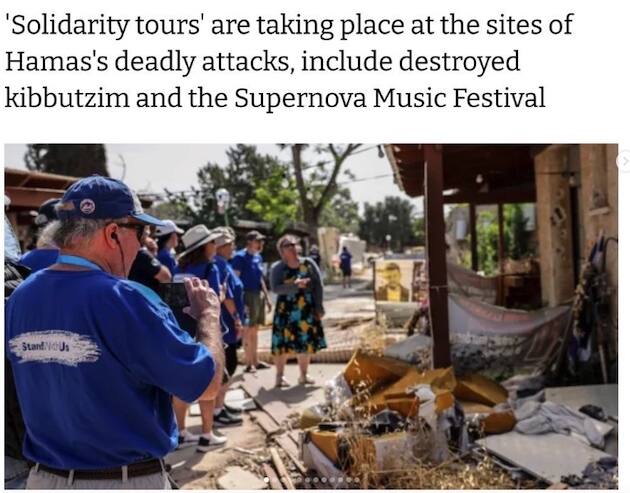Israel tourism rebounds but it’s still tough for the industry

The tourism industry in Israel is slowly rebounding as the war with Hamas seemingly winds down.
According to statistics from the Ministry of Tourism, 206,700 tourists entered the country between January and March after tours resumed. Figures for April and May have not yet been released but it looks even better.
That’s good news for airlines who are seeing record profits on the high cost of seats. “Both United and Delta are resuming their daily flights from Newark and JFK, respectively,” the Jerusalem Post reports. “Delta made a loud brouhaha about returning to Ben-Gurion Airport after eight months; United’s return is without much fanfare.” El Al, Israel’s national carrier, saw record profits in the first quarter of 2024 with European carriers also sharing in higher than normal revenue from travel to Israel.
Currently, the US State Department only lists Gaza as a “Do Not Travel” nation.

The UK news site inews.com recently reported that some of the current tourism is being driven by “solidarity tours” that include destroyed kibbutzim, the Supernova Music Festival, hospitals for injured soldiers, ‘Hostages Square’ in Tel Aviv, visiting with Israelis in their homes and Independence Square in Tel Aviv. The trips are meant to show unity among Americans, including both Jews and Christians and Israelis who believe the war is a war for existence.
The Solidarity Tours are not cheap. Some of the companies organizing them charge $8,600 per participant to visit the grim sites of the October 7 attack. That’s about double the cost of a regular spiritual tour to Israel. Still, there’s even a waiting list to join.
But most tours in Israel today are your standard tour itineraries. With the exception of certain places in the country’s north, like Tel Dan and Caesarea Philippi, most all sites remain open, including in Samaria and Judea–Israel’s Biblical heartland. And in Jerusalem.
The headlines in American news outlets, however, are more powerful than the reality on the ground. Even with some estimates saying tourism is currently about 37% of normal, that’s still not enough for those who lead tours or work in the tourism industry in Israel.
Dwight and Anita Widaman, owners of this website, lead one or two tours each year to the Holyland. Last week they announced their spring 2025 trip and, with guests from a rescheduled tour, it is already 1/3 full. “You have to plan for the future,” says Anita. “The situation will be different 10 months from now and life in Israel will be normal. So you organize a trip and work with your Israeli partners to secure the lodging, tickets for sites and airline reservations. If things change then you adjust just like for any event that’s a year away.”
The Widamans, who call their tours Heartland to Holyland, canceled one trip that should have been taking place this month. A second tour in November was rescheduled, not because of safety concerns, but because of the high cost of the airline reservations. “It was twice as high as what our guests normally pay for a ticket,” said Dwight Widaman. “By moving that trip to spring we were able to save about 50% on the cost of the airfare for our guests.”
Heartland to Holyland tours always sell out, they say, because of special sites that are included on the itinerary. Sites like Shiloh and the Wilderness Tabernacle, unique stops around the Galilee and special activities in Jerusalem, like sifting archaeological materials from the First and Second Temple periods.
“We’ve seen considerable interest in our 2025 tours,” Anita says. “It’s a combination of wanting walking where Jesus walked and showing support for Israelis as the world seemingly turns against them.”
The Widamans say, however, that security remains a top question of people curious about making the journey. “That’s normal,” says Anita. “We just give them the facts on the ground and from our decades of experience of traveling there.” Dwight adds that the safety of guests is a responsibility of any tour host and is always the top priority. “We wouldn’t ask people – our friends, family and strangeers – to join us if we didn’t feel it was safe.”
Sharon Pelleg, who previously led tours around 200 days a year, has led only nine since the attack. She urged prospective tourists not to fear traveling to Israel, stating that “life is basically normal” and most of the danger is to the far north or near the Gaza border. “Don’t forget that this is a very stable society, very warm and very protective, and very well-organized,” she says. “People here live their everyday lives regularly.”
Last Saturday, the Israel Defense Forces worked in collaboration with the Israel Security Agency and Israel Police to rescue four Israeli hostages from Hamas captivity. The operation resulted in the successful retrieval of hostages Noa Argamani, Almog Meir, Andrei Kozlov and Shlomi Ziv, who were kidnapped by Hamas during the Supernova music festival near Re’im.
After the announcement of the hostages’ rescue, Pelleg recalled that she “cried her eyes out,” but many people in her neighborhood went outside to dance in celebration. She explained that many in Israel have become invested in the hostages’ stories, particularly Argamani. A video of the young woman on the back of a motorcycle forcibly being taken to Gaza had circulated widely on social media.
Before the attacks, she believed her country’s military should be more like the U.S. armed forces in that people should be allowed to volunteer according to their abilities. She also thought the country could settle for a smaller army and rely more on technology instead. After Hamas’ attacks however, Pelleg said she no longer holds those beliefs.
Her son was drafted on Oct. 7 in the middle of the afternoon. He served the military in Gaza during the war, going back and forth between going home for a while before being called back. Pelleg said that her son is now at home to stay.
It’ is not just the young who were drafted at the war’s start. Aaron Lipkin, owner of the tour company the Widamans use for their ground arrangements in Israel, was drafted on October 8. He’s 48.
The Widamans say everyone they know in Israel has had a family member drafted or knew someone killed by Hamas. “It’s all hands on deck,” says Dwight and no one is immune from the “knock on the door.”
Pelleg agrees. “It was so difficult,” she said. “If something happens, you have three officers coming and knocking on your door. So I used to see those three officers knocking on my door every other day in my nightmares.”
Israel’s military says major operations in Gaza could wrap up by the end of June. That would be if they are not forced into a ceasefire by the United States before they finish off the last two remaining Hamas battalions in Raffah. Israelis continue to ask why the Biden administration is seeking a ceasefire while Israel is so close to victory. A victory over Hamas could have significant positive impacts for peace across the region.
That victory can not come soon enough for those Israelis who are serving, their families, or for those in the tourism industry waiting to see a mass return of American Christian tourists and restoration of their livelihoods.
–Alan Goforth | Metro Voice








